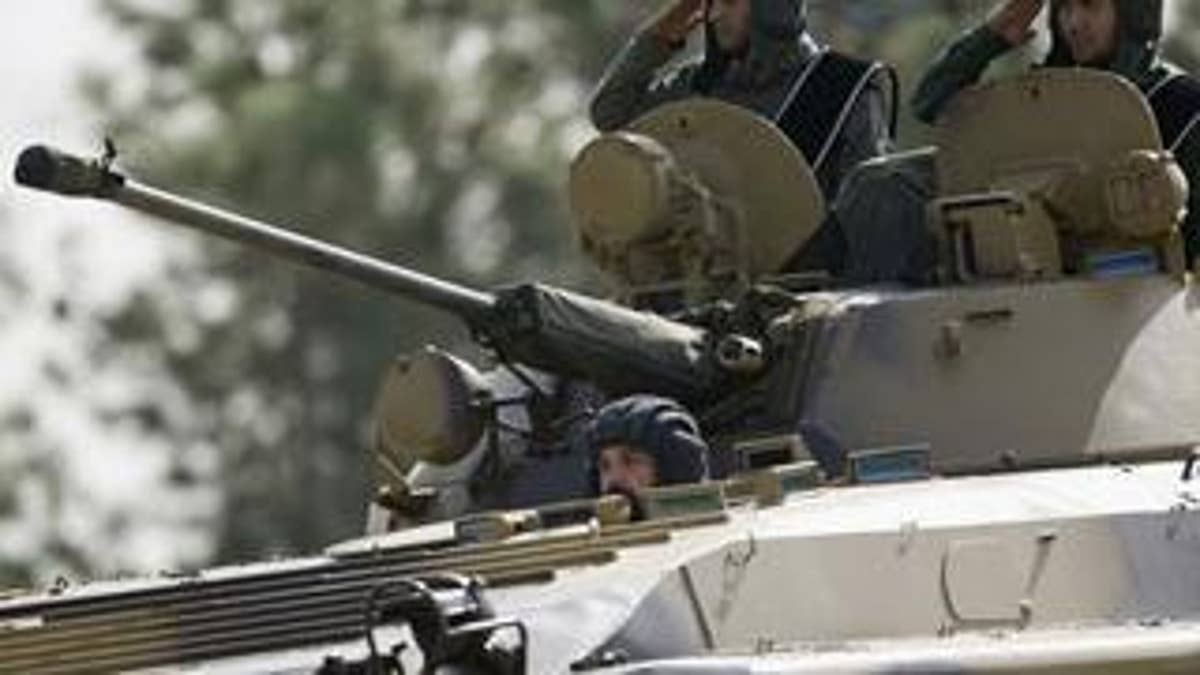
Iran's violent crackdown against demonstrators in Tehran is only the latest exploit from the Iranian Revolutionary Guard Corps that has helped the country earn its U.S.-designated label as the world's leading state sponsor of terrorism.
From its support of designated terror groups like Hezbollah and Hamas to its backing of the Iraqi insurgency, the IGRC has a formidable record of planning, supporting and funding terrorist groups in the Middle East.
The U.S. State Department added the IGRC to its list of foreign terrorist organizations last year. In April 2009, the department released its annual Country Reports on Terrorism assessment concluding that "Iran remained the most significant state sponsor of terrorism" in the world.
The Quds force, an elite branch of Iran's Revolutionary Guard Corps was identified as the main channel through which the regime supports terrorist groups abroad, according to the United States.
The report found that the Quds Force gave "weapons, training and funding" to Hamas and Hezbollah as well as Iraq insurgents and Taliban in Afghanistan. It also concluded that the secretive military branch trained the Taliban "on small unit tactics, small arms, explosives, and indirect fire weapons."
According to GlobalSecurity.org, which tracks terrorism around the world, the IGRC was founded in 1979 by the Ayatollah Ruhollah Khomeini, the leader of the Islamic revolution in Iran. By 1996, the group was said to have 100,000 ground forces and a 20,000-strong navy. It is in charge of the volunteer Basij force of youths.
The Web site says not only does the IGRC train foreign terrorist groups in Iran and Sudan, it also runs front companies and non-governmental organizations and has members working under cover as employees or officials of trading companies, banks, cultural centers and diplomatic missions.
In Iran this week the IGRC has been used to crack down on protesters angered by the presidential election that the country's supreme leader admitted was rigged. In his strongest words to date, President Obama on Tuesday condemned the violence against innocent civilians.
"The United States and the international community have been appalled and outraged by the threats, beatings and imprisonments of the last few days. I strongly condemn these unjust actions, and I join with the American people in mourning each and every innocent life that is lost," he said.
But the violence is nothing new for the IGRC. The Quds force, which name means "Jerusalem" in Farsi and Arabic, has been accused by the United States of arming militants in Iraq with deadly bomb-making material -- despite repeated denials from Iranian officials.
U.S. intelligence officials have said that Iran had prior knowledge of several Hezbollah attacks, including the 1988 murder of Colonel William Higgins in Lebanon and the 1992 and 1994 bombings of Jewish cultural centers in Argentina.
They also claim the country supported the group responsible for the 1996 bombing of U.S. military barracks at Al-Khobar Towers in Saudi Arabia that killed 19 U.S. servicemen and wounded 372 others.
In 2001, the Bush administration said that Iran has "inspired, supported, and directed" Hezbollah organizations in nations like Saudi Arabia, Lebanon, Kuwait and Bahrain, since the 1980's.
The Bush administration also concluded that Iran was providing refuge to members of Al Qaeda, who were suspected by U.S. officials of entering the country through its eastern border with Afghanistan.
"Hardline, unaccountable elements of the Iranian regime facilitated the movement of Al Qaeda terrorists escaping from Afghanistan," Zalmay Khalilzad, the administration's special envoy to Afghanistan said at the time.
In 2003, President George W. Bush named Iran as the third member of the "axis of evil," stating that terror sponsorship was his main concern.
When three suicide car bombs exploded in Riyadh, Saudi Arabia, in May 2003 -- killing 35 people -- suspicions over Iran's ties to Al Qaeda increased. The United States claimed Iran was housing several key Al Qaeda officials who were behind the attack, which meant to target housing quarters for Americans and other Westerners working in Saudi Arabia. After first denying housing Al Qaeda members, Iran announced that it had several members of the terrorist group in custody.
The United States has also charged Iranian president Mahmoud Ahmadinejad's administration with funding groups like the Palestinian Islamic Jihad and the al-Mahdi army -- groups Iran does not view as terrorist.




